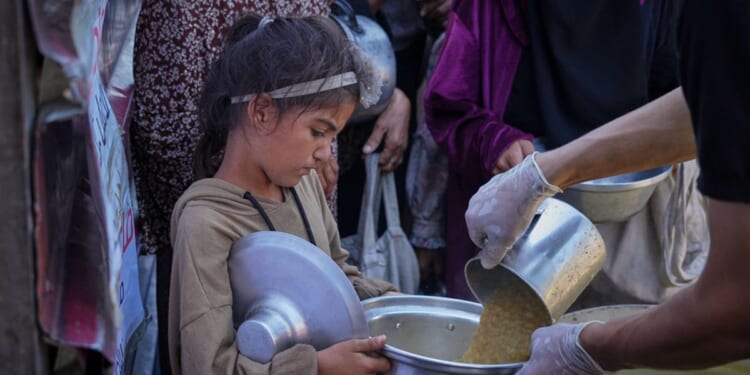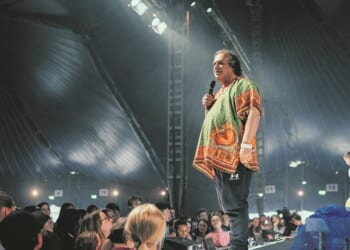AS THE second anniversary of the war between Israel and Hamas approaches, the 2.2 million people of Gaza face an escalation of already unimaginable horrors. Israel’s threatened full-scale occupation of the narrow coastal strip is now under way, and with it the forced displacement of a million people in Gaza City to the so-called safe humanitarian area of Al-Mawasi.
Last month, a man-made famine was declared: one quarter of the population now face starvation. The United Nations estimates that less than one third of the food needed by its population has entered the territory in recent months. As 80 per cent of the farmland has been destroyed, malnutrition is taking a growing number of lives of those already weakened by disease and the desperate struggle for daily existence.
Christian Aid’s partners describe to us, in their regular reports, the impact of hunger both on their work and on their own families. Having subsisted for months on nothing more than a single daily bowl of lentils, people are passing out from fatigue.
The weaponisation of hunger is a grim corollary of 24 months of massive bombardment that has destroyed or damaged more than three-quarters of the buildings: homes, schools, clinics, businesses, and places of worship. It is estimated that the ordnance dropped so far on Gaza, an area the size of the Isle of Wight, is equivalent to the combined tonnage that hit Dresden, Hamburg, and London in the course of the Second World War. More than 20,000 children and many thousands more adults have been killed as a result.
I met Reham, who works for the Women’s Affairs Centre, while visiting Gaza in May 2023. Today, she describes the trauma of living under the constant threat of bombing in Gaza City, the inability to sleep, and the levelling of houses as the Israel Defense Forces (IDF) move closer to her home.
SINCE March, the conflict has entered a new and catastrophic phase. Intense IDF air strikes ended a two-month truce. Until late May, Israel initiated a total blockade in which no food, fuel, or other supplies entered the territory. When the blockade was partially lifted, the UN-led aid system was supplanted by the Gaza Humanitarian Forum (GHF), a new entity with opaque funding and governance. Several hundred UN-administered aid-distribution points across the Strip were replaced with just four operated by the GHF — three of them in the south of the territory — and all operated in live fire-zones.
More than 1300 Palestinians have since been killed in and around these distribution points by security contractors and the IDF. More than three-quarters of Gaza is now designated as a militarised zone under evacuation orders, while whole towns, including Rafah, have been systematically demolished. Against this backdrop, restricted access to aid is now being used to drive the population to the far south of the Strip. The former Israeli PM Ehud Olmert recently likened plans to create a “humanitarian city” in Rafah to a concentration camp.
Gaza, with its history of urban settlement dating back 5000 years, is being rendered increasingly uninhabitable. Many of its people are fearful that this is the precise intention, and that, having been forced to move repeatedly since 7 October 2023, they may now face a final expulsion from their Palestinian homeland. Public statements from members of the Israeli Cabinet calling for forced displacement, together with reported discussions with third countries about taking people from Gaza, only reinforce the fear of total dispossession.
THE recent UN Commission of Inquiry, which concluded that four of the five acts constituting genocidal intent have been committed in Gaza (News, 19 September), underscores the fact that the future of the Palestinian people and their hopes for a nation state now hang in the balance — as does the principle that wars have rules: rules that were hard won and born of the bitter experience of human suffering during past conflicts.
Without accountability for violations, international law is a paper tiger. The war crimes committed against Israelis on 7 October 2023 and the continued crime of holding hostages do not provide any moral or legal justification for the crimes committed since then against civilians in Gaza. The devastation wrought in Gaza, described, rightly, by Pope Leo as collective punishment, and the apparent impunity with which it is being carried out, demands a far stronger response.
For any peace to hold, it must be a just peace based on accountability for crimes committed, and equal dignity and security for all people who live between the River Jordan and the Mediterranean Sea. The Palestinian people must, therefore, be active participants in peace, not bystanders. This will require a clearer path to a durable political settlement. The UK’s recognition at the UN last week of a Palestinian state is an important step towards this (News, Comment, 26 September). Yet, the UK continues to export parts for F35 jets and maintains a preferential trading status for Israel in spite of its human rights violations.
A lasting peace grounded in international law matters most urgently for the people of Gaza; and yet it also matters for the victims of war everywhere, now and in the future — because, in the absence of international law, all that remains is the law of the jungle.
Patrick Watt is the chief executive of Christian Aid.
Christian Aid was part of a call for churches to mark the International Day of Prayer for Peace on 21 September. Christian Aid’s Middle East Appeal continues to support humanitarian work in Gaza and across the region.

















